
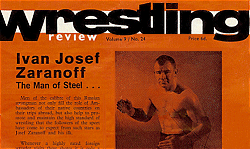

|
 |
|
| Professional wrestling
was originally a feature of local fairgrounds and stage variety, being presented
alongside 'strong man' acts around the end of the nineteenth century. In
the early 20th century a sports promoter called Charles Cochran staged a
wrestling match between Estonian Georg Hackenschmidt and Tom Cannon of Britain,
advertised as 'The European Greco-Roman Championship'. Hackenschmidt won
and subsequently became the unofficial 'World Champion' when he defeated
American heavyweight champion Tom Jenkins in America in 1905. Following
this, Hackenschmidt undertook a series of challenge matches arranged by
Cochran for which he was paid £150 a week. The 'professionals' generally preferred to fight in America where the money was better and, by the outbreak of the First World War in 1914, it had more or less died out as a professional sport in Europe. It remained fairly popular in its amateur form but did not really return to the UK as a professional sport until the 1930s when it was contested as an 'all-in' style, as was then practiced in the North of England, rather than in the more structured amateur 'Greco-Roman' format. The 'British Wrestling Association' was formed by ex-amateurs Sir Atholl Oakley and Henry Irslinger, who started to put on promotions featuring 'stars' such as 'Black Butcher' Johnson, Tommy Mann, Jack Pye and Jack Sherry. Oakley himself contested a series of self-promoted elimination bouts and was crowned the first 'British Heavyweight Champion'. The sport, in various forms, became increasingly popular during the 1930s and London alone boasted around 40 regular wrestling venues. A number of variations started to arise, including wrestling with the use of weapons allowed, mud-wrestling and, even then, female wrestlers were not particularly unusual. When it all started to get out of control in the late 1930s the London County Council banned professional wrestling as a public spectacle just before the start of World War II, which contributed to its decline in the UK for a second time. Post-war events were dogged by obvious showmanship and acting and, following several unsuccessful attempts to revive the spectacle as a legitimate 'sport', a committee was created to formulate 'official' rules for 'professional' wrestling. This assembly consisted of Admiral Lord Mount-Evans, Commander Campbell, Olympic wrestler Norman Morell and M.P. Maurice Webb. This committee decided that there would be seven weight divisions, each having its own 'champion', which were to be Lightweight (154lbs), Welterweight (165lbs), Middleweight (176lbs), Heavy Middleweight (187lbs), Light Heavyweight (198lbs), Mid Heavyweight (209lbs) and Heavyweight (over 209lbs). |
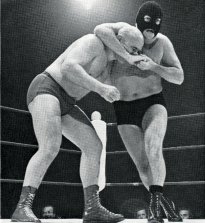 |
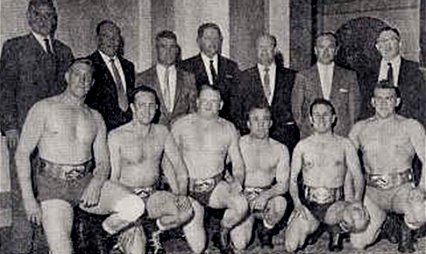 |
The matches were to consist of
5 minute rounds with the best of 3 falls or a 'knockout' ten count deciding
the winner. Attacking a man on the canvas was outlawed and public warnings
and disqualifications for breaking the rules were introduced. Promoters
were happy to accept the new rules and committee to inject some structure
and consistency into their promotions. In order to use these to their best advantage, a cartel alliance called 'Joint Promotions' was formed in 1952, four years after the formation of the NWA in the USA, to regulate the business and, effectively, control the professional sport in the UK. The London representatives of 'Joint Promotions' were Dale Martin Promotions who were formed in 1948 by Jack, Johnny and Billy Dale (Abby) and Les Martin. The Manchester area was represented by Arthur Wright, Liverpool by Billy Best, Scotland by Olympic gold medalist George de Relwyskow with Ted Beresford and Norman Morell representing Yorkshire. As a cartel they were able to 'shut out' independent promoters and group secretary Arthur Green was soon putting on more than forty shows a week, with each promoter rotating their 'stable' of professional wrestlers. In establishing this control, Joint Promotions were keen to maximise the revenue by increasing the number of available 'titles' and title-fights and the whole business was becoming in danger of over-exposure as the number of 'title holders' grew to about 70. At that time, entertainment revenue tax was 25% and the control of events and the guaranteed work was beneficial to both promoters and wrestlers alike. However, this was a level that the business could not sustain and eventually, after Atholl Oakley dropped out of promotions and the closure of the Harringay Arena, it was abolished in 1957. One of the first breed of anonymous 'masked' wrestlers was a character called 'Dr. Death', an Australian whose real name was Paul Lincoln, who bought the famous 2Is coffee bar in Soho in 1955. The concept of being masked was both a good crowd-puller and a good earner as it allowed these gladiators to fight twice on the same bill! It was television that was to be the real saviour of British professional wrestling and, during its 33 years of regular live coverage, bring it to the forefront of sports entertainment for the British viewing public. |
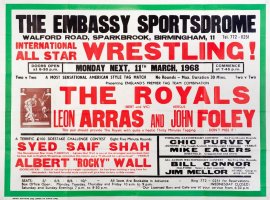 |
|
It was to be promoted to a 'daytime' feature
in 1964 when it was taken up by the Saturday afternoon ITV broadcast 'World
of Sport' and given its own regular weekly slot. Saturday shows during 1965
were broadcast as part of the SummerSport magazine show, and later World
of Sport. Until the end of August 1966 shows aired on Saturday afternoons
at 4pm (as part of World of Sport) and Wednesday evenings. From September,
wrestling moved to 5.15pm, after World of Sport. Wednesday evening showings
stopped until late December. This increased exposure on television also boosted the demand for live wrestling events and, by the middle of the 1960s, Joint Promotions were arranging in the region of 4,500 shows a year. In its television infancy the bouts placed a strong emphasis on clean, 'technical' wrestling with the 'bad boys' such as Mick McManus and Jackie Pallo, who were to become almost cult, compulsive viewing, not rising to stardom for some years. A version of the sport known as 'tag team' wrestling also became very popular, but televised matches were restricted, only being shown once a month or so, to avoid them becoming over-exposed and detracting from the individual events. At this time, women were barred from the professional sport by the GLC and would continue to be so until the late 1970s. Probably the best-known TV commentator was Kent Walton, a very interesting character himself. Born in Cairo on 22nd August 1917 he moved to Surrey in England at a young age and became a successful springboard diver. During World War II he joined the RAF where he served as both radio operator and front gun operator in a bomber. He married Lynn Smith in 1949 and his distinctive voice allowed him to become a sports commentator, mostly on football and Wimbledon tennis, before becoming 'the voice of wrestling' in 1955 until its cancellation in 1988. Sport commentary was not his only contribution to show business as he was also the presenter of the first television pop show 'Cool for Cats', owned a successful film production company and provided many TV commercial voice-overs before his death in August 2003. |
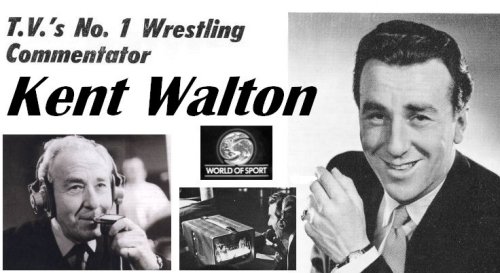 |
| Some names you
may remember ..... Mike Marino, Al Fontayne, Brian Maxine, Honeyboy Zimba, Eddie Capelli, Leon Fortuna, Bert Royal, Roy 'Bull' Davies, Rocky Wall, Alan Dennison, Jan Kovacs, Reg Trood, Steve Logan, Steve Haggerty, 'Irish' Pat Barratt, Tony and Ignatius Borg, Leon Arras, Count Bartelli, Crusher Verdu, Johnny Saint, Joe Cornelius, Lindy Caulder, Horst Hoffman, Lee Sharron Billy Joyce, Billy Two Rivers, Wayne Bridges, Ian Gilmour, Zando Zabo Geoff Kay, Sheik El Mansouri, Julien Maurice, Peter Preston, Steve Best Sid Cooper, Peter Szakacs, Mick McMichael, Pete Roberts, Peter Rann George Kidd, Mick McManus, Roger Green, Pat Roach, Bobby Barnes Ernie Riley, Johnny Kwango, Les Kellett, Ted Heath, Ray Fury, Steve Veidor Roy St. Clair, Johnny Yearsley, Tony St. Clair, Alan Miquet, Jim Hart, Masambula, Tibor Szakacs, Jim Hussey, Johnny Williams Ricki Starr, Johnny Eagles, Tony Charles, Mal Kirk, Alan Sargeant El Greco, Ivan Penzecoff, Alan Colbeck, Judo Al Hayes, Seamus Donlevy Colin Joynson, Zoltan Boscik, Clayton Thomson, Jackie 'Mr TV' Pallo Tug Holton, Johnny Apollo, Jim Breaks, Wild Angus, Tony Cassio Jack Dempsey, Spencer Churchill, Josef Zaranoff, Johnny Kincaid, Reverend Michael Brooks, Adrian Street, Johnny Czeslaw, Eric Sands Farmer John Allan, Al Nicol, Terry Downs, Bruno Elrington, Mike Eagers, Prince Kumali, Ken Joyce, Vic Faulkner, Peter Cortez |
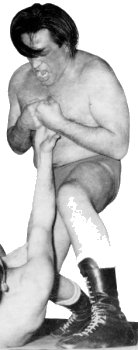 |
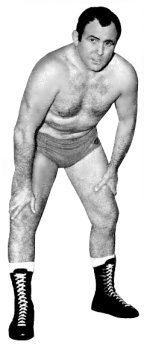 |
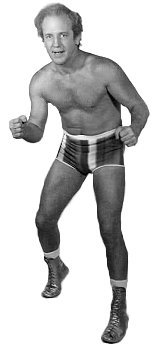 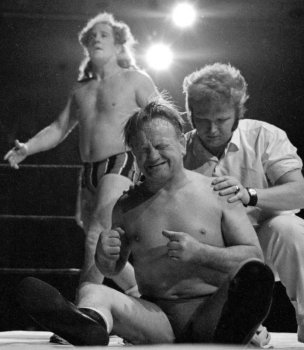 |
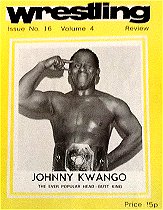

|
|
All
Original Material Copyright SixtiesCity
Other individual owner copyrights may apply to Photographic Images |